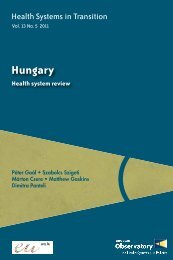Canada - World Health Organization Regional Office for Europe
Canada - World Health Organization Regional Office for Europe
Canada - World Health Organization Regional Office for Europe
Create successful ePaper yourself
Turn your PDF publications into a flip-book with our unique Google optimized e-Paper software.
<strong>Health</strong> systems in transition <strong>Canada</strong> 57<br />
pressure on governments to establish less difficult complaints procedures. As<br />
a consequence, some provincial and territorial ministries of health (through<br />
external ombudsmen offices or a ministry office), RHAs and hospitals have<br />
established internal complaints procedures, although the main remedy remains<br />
private – through complaints to private professional regulatory authorities at the<br />
provincial and territorial level of government. These complaints can range from<br />
concerns about the poor bed manners of some health professionals at one end of<br />
the spectrum to allegations of life-threatening medical errors (<strong>for</strong> a discussion<br />
of the possibility of obtaining redress through the tort system, see section 2.8.2).<br />
2.9.5 Public participation, patient satisfaction and patientcentred<br />
care<br />
Other than through general participation in the political system, there are<br />
few <strong>for</strong>mal vehicles <strong>for</strong> direct public participation in health system decisionmaking.<br />
At the time regionalization was introduced in <strong>Canada</strong>, one of the stated<br />
objectives was to extend public participation through elected RHA boards. For<br />
the most part, this objective was either not implemented or, when implemented<br />
in a few jurisdictions, was altered subsequently (Lewis & Kouri, 2004; Chessie,<br />
2009). Today, the majority of RHA board members are appointed by provincial<br />
ministers or ministries of health and participation is largely limited to input<br />
from self-selected or appointed citizen advisory groups (Chessie, 2010).<br />
Based on the results of recent Commonwealth Fund surveys of all patients<br />
(HCC 2010b) and sicker patients (Schoen et al., 2011) in 11 high-income countries,<br />
Canadians expressed considerable dissatisfaction about numerous aspects of<br />
provider access and the quality of the services they received (Table 2.5). In the<br />
more general 2010 survey, Canadians had among the poorest outcomes in terms<br />
of access to a doctor or nurse, waiting times <strong>for</strong> elective surgery or to see a<br />
specialist, and the highest reliance on emergency departments <strong>for</strong> care (Schoen,<br />
Osborn & Squires, 2010). Consequently, 61% of the patients sampled felt that<br />
the Canadian health system was in need of fundamental re<strong>for</strong>ms or to be rebuilt<br />
completely, which was lower than in Australia (75%) and the United States<br />
(68%) but higher than France (58%), Sweden (53%) and the United Kingdom<br />
(37%). However, the 2011 survey results <strong>for</strong> sicker patients reflect better-thanaverage<br />
results in terms of health system coordination and shared decisionmaking<br />
with specialist physicians.
















